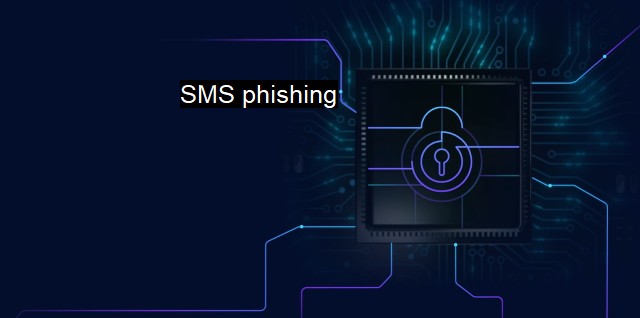What is SMS phishing?
SMS Phishing: Understanding the Dangers of Social Engineering Attacks via Text Messages in Today's Digital Age
"SMS phishing" , often known as "smishing", is a type of scam that occurs through SMS (Short Message Service). Based on conventional phishing, SMS phishing replicates the same approach but through text message service on your smartphone. It is critically related to cybersecurity since it's primary objective is to trick an individual or organization into revealing confidential information for malicious motives which might lead to serious data breaches or financial loss if responded.The approach in this context is simple. A cybercriminal sends an SMS appearing to be from a trusted source such as a reputable organization, banking institution or government authority. The received SMS normally contains website links which when accessed, prompt you to enter personal information. These could be sensitive details such as bank account information, credit card details, social security number or even login credentials. Sometimes, these phishing texts might contain a message for downloading a software, which in reality might be malicious application looking to infiltrate your device.
Often cybercriminals use fear tactics to accomplish their goal. An example could be an imperative message that your bank account has been compromised, or your outstanding tax payment is due. Alternatively, they may pamper you with tempting offers, looking to coax out your financial details.
To understand why SMS phishing is a significant threat in the digital landscape, it’s critical to comprehend the sphere of mobile technology. The ubiquity of smartphones has turned them into an essential part of our lives and a significant tool of communication. As a result, malicious actors perceive these devices as an enormous potential to elicit valuable information and resulting in increased cases of SMS phishing attacks.
Due to the increasing sophistication of phishing scams, it's become more difficult to distinguish between a genuine message and a scam. Cybercriminals have been found to use "spoofing techniques" to manipulate the sender ID to appear as if the text is coming from a legitimate entity, further misleading recipients into believing and ultimately becoming victims of such scams.
A potent way to defend against SMS phishing for individuals and organizations is to implement antivirus solutions. While many might perceive antivirus software to be solely focused on devouring computer viruses, modern versions have significantly evolved. Contemporary antivirus software guards against trojans, worms, ransomware and importantly, phishing scams including SMS phishing.
It provides protection through scanning for and alerting you on malicious links. It helps you identify whether the text received has a hazardous link, minimizing the
Chance of getting tricked into providing personal information. Besides, regular software updates ensure that antivirus solutions keep up with the changing tactics of cybercriminals.
In addition to antivirus software, security awareness training is crucial in strengthening one's defense. This exposure equips users with the knowledge to recognize red flags in dubious messages, understanding that reputable entities never solicit sensitive information via text messages amongst others.
In light of rapid technological advancements, it's no surprise that both the scope and intricacy of cyber threats like SMS phishing are expanding. Subsequently, comprehensive antivirus solutions and vigilant user behavior will undoubtedly play pivotal roles in fending off such cyber attacks. It is crucial to verify any text before offering personal details and to remember that when an offer seems too good to be true, it most likely is. Another significant stride towards cybersecurity is to promptly report suspicious activities, curbing future likelihood of such insidious scams becoming successful.

SMS phishing FAQs
What is SMS phishing?
SMS phishing (also known as smishing) is a type of cyber attack where attackers use text messages to trick users into sharing sensitive information or downloading malware onto their device.How can I identify SMS phishing attacks?
SMS phishing messages typically contain urgent language, a sense of fear or urgency, and often contain a link or phone number to call. It's important to be cautious of unexpected text messages and to verify the sender's identity before sharing any sensitive information or clicking on any links.How can I protect myself from SMS phishing attacks?
To protect yourself from SMS phishing attacks, always verify the sender's identity before responding to any text messages. Additionally, never click on any links in unexpected messages, and avoid sharing any sensitive information over text unless you have verified the recipient's identity. Using antivirus software can also help detect and prevent SMS phishing attacks.What should I do if I fall victim to an SMS phishing attack?
If you believe you have fallen victim to an SMS phishing attack, it's important to act quickly. You should immediately change any passwords associated with the compromised account, and contact your bank or credit card provider to report any fraudulent activity. It's also recommended to install antivirus software to scan your device for any malware that may have been downloaded as a result of the attack.| | A | | | B | | | C | | | D | | | E | | | F | | | G | | | H | | | I | | | J | | | K | | | L | | | M | |
| | N | | | O | | | P | | | Q | | | R | | | S | | | T | | | U | | | V | | | W | | | X | | | Y | | | Z | |
| | 1 | | | 2 | | | 3 | | | 4 | | | 7 | | | 8 | | |||||||